
Illustration by James Shedden.
Back in mid June I attended my third Transition Towns Conference down in sunny Devon at Seal Hayne, this an impressive looking agricultural school that has been gradually sold off and now houses a special needs education college. This year’s conference was attended by a record amount of people, cialis 40mg all involved or interested in the Transition Towns concept, sildenafil which is a grassroots movement whereby local communities convene to find ways to become more resilient and self-sufficient in the face of peak oil and climate change.
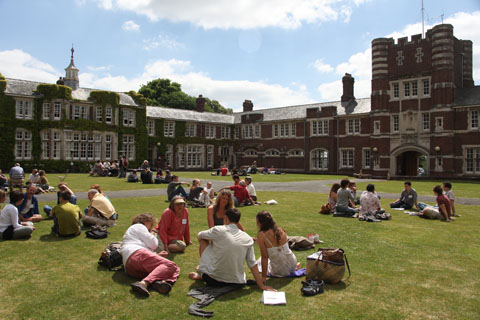
All photography by Amelia Gregory.
It can be hard to reconcile the need to attend important events with a desire to cut out the carbon emissions that flying entails, but some Transitioners had so I got to meet loads of interesting people from all over the world. In fact, during the breakfast queue on the very first day I got chatting to someone who is part of the movement in the US, and found that she was encountering all sorts of problems due to the fact that one *entrepeneurial* character has already patented the term Transition (insert any state here) for himself. This is what happens when a grassroots movements with no particular code of conduct becomes successful in our current world. Telling, perhaps, of our innate human nature, and our desire for ownership of a good idea. Not only that but she told me how her nascent Transition organisation has managed to secure all its funding without really putting any working relationships in place at the grassroots level, and all the problems that has entailed. Sometimes I do wonder if we will ever learn…
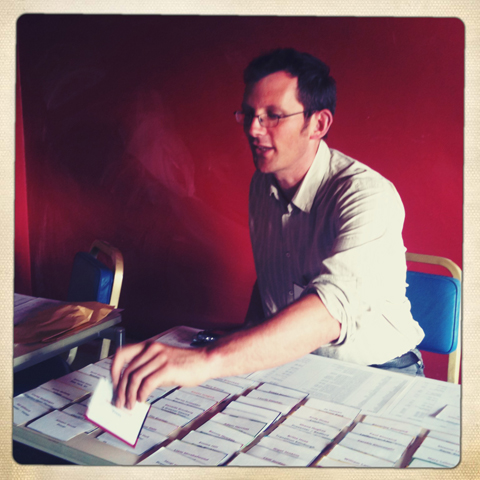
Rob Hopkins hands out name tags.


Future We Want by Gareth A Hopkins.
I will hold my hands up and admit that I am not actively involved in a Transition Town myself, but I’ve known founding members Rob Hopkins and Ben Brangwyn for many years now and have always felt I can serve a useful role in bringing the concept of Transition Towns to the attention of others through my writing and photographs. Why am I not involved myself? Probably a combination of factors. People tend to get involved in Transition Towns at a certain stage in their lives. Hence it is a predominantly middle aged movement, although this year I was pleased to note a positive trend towards many younger participants, glimpsed amidst the sea of greying heads.
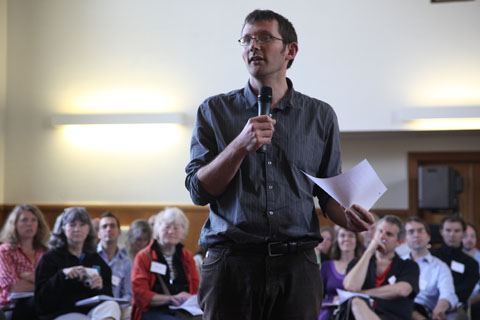


And I don’t feel hugely settled in my life. I therefore don’t feel a strong affiliation to my very close locality, and there is no group in Bethnal Green that I know of, which would mean I would have to start one up myself. Which brings me to my next problem – I have a serious lack of spare time because I currently feel it’s more important to expose the root causes of our problems through direct action against the system with Climate Camp. Something which is always done in conjunction with efforts to build sustainable community. Indeed many people within Climate Camp are also actively involved with a Transition Town. By attending the Transition Towns conference I not only hope to spread ideas beyond the confines of those who can afford to make it to Devon for a weekend, but I also hope I can act as a bridge between different aspects of a much wider movement to build a better world.




The weekend was taken up with many different forms of workshops and interactive lectures. We scribbled lots of thoughts on paper, talked in small and in large groups about all kinds of thorny issues, went for a wild food walk, climbed to the top of a little knoll high above the college to talk about the changes in landscape, provided our own entertainment… and watched the World Cup en masse. We were extremely lucky with the weather, sitting outside for lunch and enjoying fabulous views over Newton Abbot.
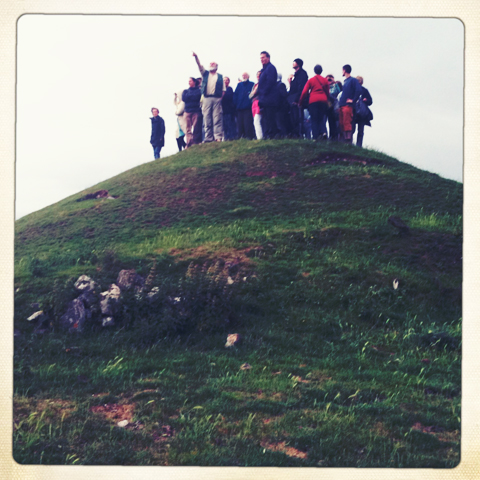

Wild food walk by James Shedden.
Rob Hopkins introduced us to his latest idea, which combines his original 12 steps to transition as outlined in The Transition Handbook with the concept of ‘generative grammar’ behind A Pattern Language. This was the seminal work of some progressive American architects in the 1970s, and has since become a bible of permaculturists. A few years of learning down the line the initial 12 step process seems overly simplistic and so it was intriguing to hear Rob’s new ideas alongside the opportunity to feed our own ideas into his work. I can see how this new trajectory makes sense but I hope he will take into account the layperson’s inability to digest thick books filled with lots of complicated roman numerals.
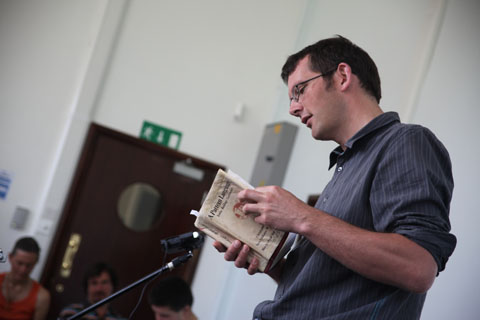


My contribution to Rob’s new ideas.
As always some of the most important conversations were had in the gaps between – chatting to my table mates whilst eating a delicious locally sourced vegan lunch, snatching a sneaky chat with old friends in the corridor or whilst propping up the bar. Such is the way at most such events – and Transition Town conferences are always planned with lots of open space in mind.


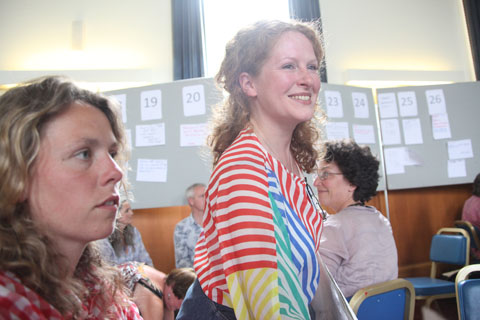
2010 feels like a time of introspection for the movement. Throughout my conversations with people what struck me time and again was the importance of solid foundations and a network of successful relationships. Many Transition Towns have reached a critical point where they are struggling to hold their local group together, either because of a division in ideology, or because a committed few are getting bogged down with all the admin and are consequently too stressed to create a happy working environment for newcomers to enter – it’s a problem we are also experiencing within Climate Camp, and something which afflicts many organisations that have reached a certain stage in their lifecycle. Because people who get involved in social change tend to be passionate types they want to make change happen as quickly as possible by pushing forward with exciting new plans, often before a firm base has been built. And especially because it can be tedious to set up a solid core when all you really want to do is eat yummy local food. Food is always a main focus for Transition Towners. Admin less so. You can see why really, can’t you?


For this reason meetings need to be as pleasurable an experience as possible. I attended a wonderful facilitation workshop given by Matthew Herbert of the Rhizome Collective but it was sadly under-attended, probably due to the diversity of other offerings on offer at the same time. Climate Camp holds large scale consensus meetings extraordinarily well thanks to the kind of information spread by Rhizome, and all Transitioners struggling with group dynamics should attend such workshops. This is the kind of invaluable information you really can’t learn from a book – so it’s important to learn by doing. Fortunately Rhizome are available to come and speak to local grassroots groups everywhere across the UK.
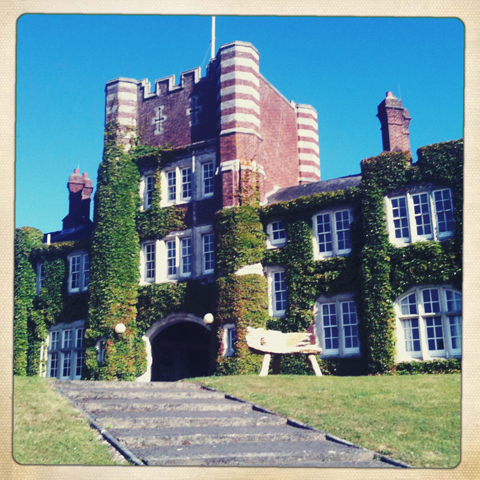

For me, the undoubted highlight of the whole conference was hearing from Nicole Foss – also known as Stoneleigh on her website the Automatic Earth – who lectured us in the most accessible way possible about the perilous state of our financial global economy. I am certainly no mastermind when it comes to understanding our current capitalist system, but Nicole somehow made the scariness of our disastrous potential future sound understandable and even inspiring, which was no mean feat. She was so wonderful I have decided to dedicate a whole blog to her ideas.

Nicole Foss, AKA Stoneleigh.


It was telling, I thought, that at the end of Stoneleigh’s talk people asked how they could protect their own investments with little concern for those far less well off than themselves. “Are you trying to sustain the way you live or live sustainably?” asked another Transitioner. This is an increasingly important question for the Transition Towns movement, which continues to attract a predominantly white middle class demographic. How and what does Transition mean for those less able to commit their time, energy or resources? This and many other questions are currently being mulled over by individuals and groups up and down the country, something I find truly inspiring.

Illustration by Natasha Thompson.
One of the best things about the Transition Towns movement is its ability to attract people who are already doing something wonderful within the field of sustainability in their local area. It is increasingly providing a sexy central hub for a growing network of dedicated individuals, and this aspect needs to be better recognised. Who isn’t already involved in growing their own food in some form of community setting when they join a Transition Town food group, for instance? Long may this wonderful movement continue to grow and energise communities everywhere. Find out how to get involved with Transition Towns by visiting their website here.
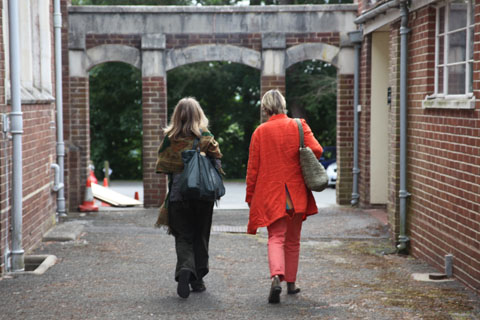

If We Can’t Imagine a Postive Future by Gareth A Hopkins.
Categories ,Automatic Earth, ,Ben Brangwyn, ,Climate Camp, ,Facilitation, ,Gareth A Hopkins, ,James Shedden, ,Natasha Thompson, ,Nicole Foss, ,Rhizome, ,Rob Hopkins, ,Stoneleigh, ,transition towns
Similar Posts:
- Brixton makes transition
- Reclaiming power at Copenhagen!
- ‘Local Food’: Rob Hopkins returns
- Arts workshops this weekend at Climate Camp
- Be Prepared, Be Inspired and Be Involved
